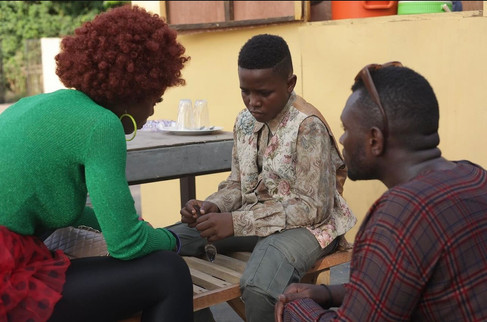
© Duke Tetteh-Quarshie, Wisdom Franklin, Elizabeth Boateng
"No one can tell your story better than you": Nollywood's new chapter of cultural films explored through the lens of Ifan Ifeanyi Michael and his debut short film 'The Boy Who Never Falls.'
In the heart of Lagos, where life's rhythms continue to echo through the streets, Nollywood films are weaving a tapestry of stories that connect the past, present, and future. The Nigerian film industry stands as a powerful testament to storytelling's enduring magic, crafting stories of love, betrayal, myth, and reality. With each frame, they invite audiences to embark on a journey of discovery, to celebrate the nation's rich heritage, and to be inspired by the narratives that define them.
Initially driven by passionate visionaries armed with minimal resources, it is now recognised as the second biggest film industry in the world, in terms of production, and with each film it solidifies its place in world cinema, firmly rooted in the heart of Africa.
We had the pleasure of chatting to a frontrunner of the Nollywood industry: actor, director, writer, producer and brand consultant - Ifan Ifeanyi Michael. On the Forbes Africa 30 under 30 list makers, he is on a mission to push Nollywood to further heights and his film, 'The Boy Who Never Falls' not only showcases his life’s journey, but is a testament of what it means to survive. As Ifan says: “No one can tell your story better than you.”
Determined to make it in the film industry, Ifan left his parents on a night bus from Port Harcourt to Enugu at just the age of 10. He then journeyed to Lagos, only to find the national theatre closed on Sundays. Directed to the legendary Winis Hotel, a thriving hub for aspiring actors, he landed on his feet – briefly. "I got to see it [Nollywood] at such a young age with nothing in my pockets but a dream of becoming successful that I had for myself.”
However, after his resources dwindled, chance encounters with a kind dancer, Ruby, and a stranger, Chidinma, provided temporary shelter. Yet, a misunderstanding forced him back onto the streets, facing another setback on his challenging path to the big screen.
It is here that Ifan tells his story through his autobiographical short film 'The Boy Who Never Falls.' The film, and accompanying documentary, explores themes of resilience and culture and follows Ifan’s journey as a young Nigerian boy who had a goal to make it in life despite the fact that the odds were against him. It is a unique story and transcends to being a testament of truth; Ifan made sure to make this something everyone will understand fully.
“The film shows so much compassion and empathy. I wanted to be an actor, have a voice in the entertainment industry. I didn’t plan to be a director or a producer but I knew I was talented and there was a space for me in the Nollywood industry. I followed this dream with so much passion and enthusiasm, I didn’t care if I was going to die on the line. Coming from a broken home and still having to find my voice was all a miracle to me.”
The film is mostly themed in the 90s, utilising nostalgic cinematography that is something that will resonate with audiences. In addition, he personally visited the various locations where his journey began as a boy and obtained permission to shoot there. As he notes; "I didn’t want to lose the real essence of telling my story; I still wanted to keep it real in terms of respect to our culture in filmmaking. I needed the film to be raw."
'The Boy Who Never Falls' marks a significant turning point in Nollywood's evolution. It's trading fiction for the authenticity of real-life stories, where the pages of history become its script, and the characters are not merely imagined but drawn from the annals of Nigeria's past and present. These films are not merely entertainment; they are a lens through which we can glimpse the trials and tribulations, the courage and resilience of those who came before us. They offer a bridge between generations, enabling today's audience to connect with the struggles and triumphs of their forebears.
However, it is important to note that the emergence of these films in Nollywood is not without its challenges. Crafting narratives based on real-life events demands a level of research, attention to detail, and historical accuracy that surpasses that of traditional fictional storytelling. Filmmakers must balance the creative liberties inherent in storytelling with the responsibility to honour the truth and the experiences of those who lived these stories.
Furthermore, they require a deeper level of engagement from both filmmakers and audiences. They challenge viewers to connect with their cultural heritage, to reflect on the lessons of the past, and to engage with the complexities of their society. It is a shift from passive entertainment to active participation in the preservation of cultural memory.
“Every director or producer has their ways of making a film and not everyone might want to be detailed in making films like me. Nollywood has evolved and the techniques used now should make things easier; the stories the directors and producers are making should be authentic and should be directed towards our culture.”

© Duke Tetteh-Quarshie, Wisdom Franklin, Elizabeth Boateng
Ifan is here to make sure that Nollywood stays alive. His advice to young filmmakers is for them to always continue honing their craft and when the opportunity strikes, you’ll feel like you’re ready to take that step. Whilst he notes that funding is a major issue, he attributes constant collaboration as a solution to the problem. Overall, he explains that as a filmmaker, you must be ready and able to blend in, to keep the faith alive and know that rejections will come but just keep going.
“I have never limited myself and for me to be part of such a resurgence, it is something I’m proud of and will do again and again.”
From script to true story, Nollywood's evolution is thrilling and this new chapter promises to be a compelling and transformative one, where the power of storytelling meets the authenticity of history.















Kommentare